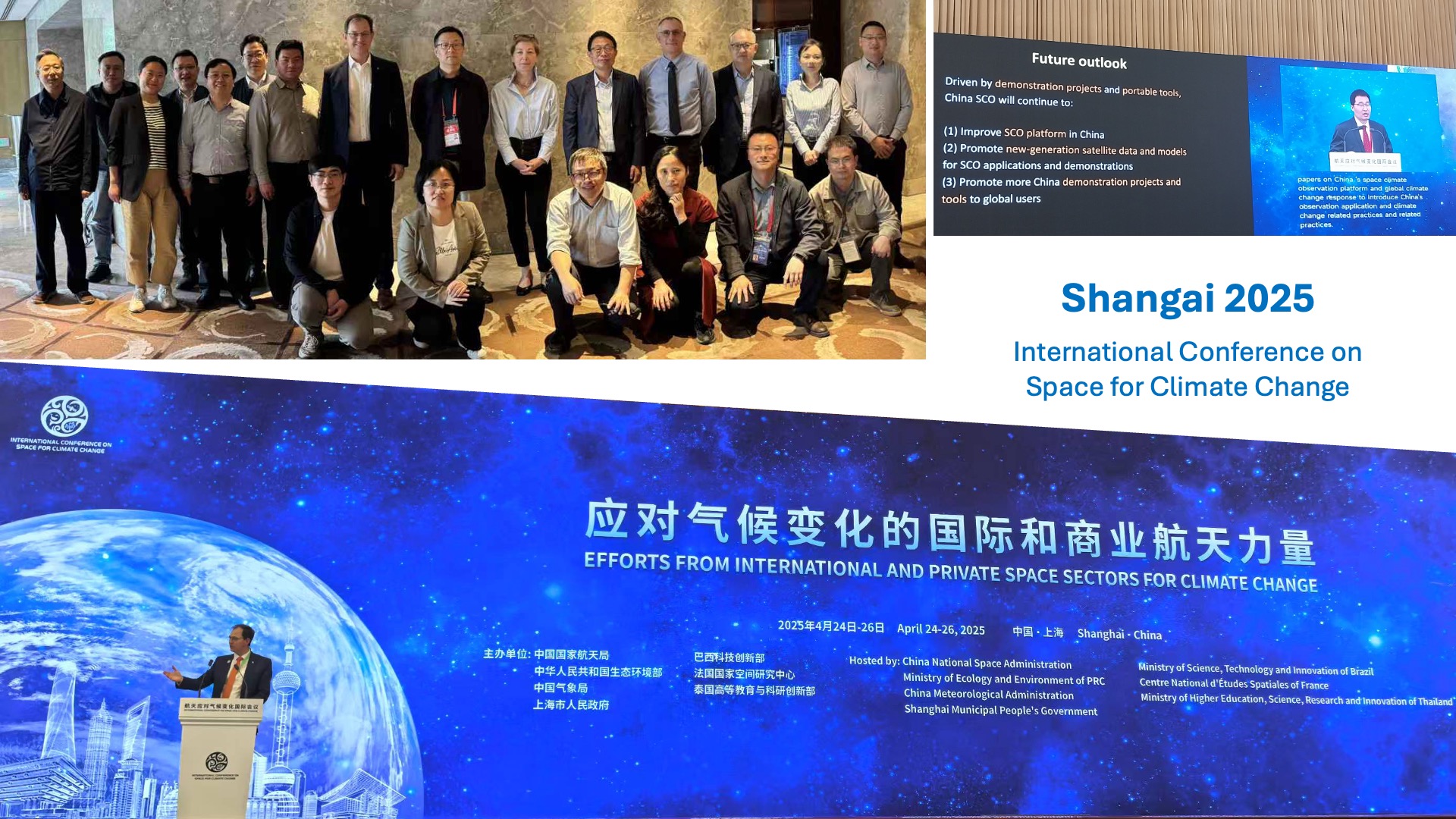"This is just the beginning", SCO at China Space Day
Video "Observe, Collaborate, Act: Space for the Benefit of Climate", users from all over the world testify to the real impact of SCO projects
For the SCO, as for the great space adventure, history is made day by day. Every year, China Space Day commemorates the launch of China's first satellite, Dong Fang Hong I, in 1970. Under the poetic theme "Where Sea Meets Moon", the 2025 edition brought together more than 1,000 participants from around the world, representing agencies, research institutions, governments, and industry. In this dynamic context, the SCO was given a central role in showcasing the contribution of space to climate resilience.
🇫🇷 Ten years after Paris: the SCO in the spotlight
Ten years after the signing of the Paris Agreement and almost five years after the adoption of the SCO Charter, this session came at a symbolic moment. Today, the SCO has become a dynamic alliance with 53 signatories supporting more than 110 operational projects worldwide.
🎤 In his keynote speech entitled "This is only the beginning: Stories from the Space for Climate Observatory", Frédéric BRETAR, head of SCO France for CNES, recounted the growth of the SCO, now an international network of 53 signatories supporting more than 110 operational projects around the world. In his lively and dynamic account, he also recalled a threefold promise on which the SCO is built:
- To bring together an international network of space agencies, public entities, and private actors to produce actionable knowledge from Earth observation data.
- To deliver operational tools that help decision-makers understand and adapt to climate impacts at local scales.
- To promote the scaling-up of digital solutions and strengthen cooperation for climate adaptation and sustainability.
Illustrating the point, Mr Bretar underlined the "undeniable success of the SCO for scientists, society and the economy of Earth observation services, and, we hope, for a better understanding of the proven consequences of a rapidly changing climate. I say this, but it is above all the users involved in the projects who bear witness to this". And to conclude, the new SCO film which is shown above🎬
The presentations that followed confirmed that history is well and truly in the making
🇨🇳 SCO China: from data to constellations, scaling national innovation
🎤 Prof. Li Zhengqian, a key figure in the Middle Kingdom's Earth observation and climate ecosystem, represented SCO China with an ambitious and inspiring presentation. In a visionary presentation, he shared how China is integrating climate monitoring into a national long-term strategy. A central feature of his talk was the announcement of China’s plan to develop an “environmental and climate satellite array”, composed of “eight virtual constellations” designed to monitor 6 essential climate variables: 3 atmospheric variables (aerosols, carbon dioxide CO₂ and water vapor), 2 oceanic variables (sea surface temperature and water-leaving reflectance), and 1 terrestrial variable (land surface reflectance).
This initiative aims to provide a “comprehensive, long-term and high-precision observation system for global climate change indicators. It reflects China’s ambition not only to contribute data, but also to lead innovation in climate satellite development said Prof. Li. He also expressed a strong wish that the SCO act as a platform to support “technological breakthroughs, including the development of a carbon observation satellite series”, which would enhance the global capacity to monitor and verify carbon emissions and sinks with high spatial and temporal resolution.
Of course, SCO China’s strength is already visible in its growing portfolio of operational SCO projects such as DUST, IRRITRACK, HydroLake and FireAlert. “These projects reflect China's ability to move from data to decision and demonstrate how national programs can be scaled through the SCO framework” concluded Pr Li.
🇹🇭 SCO Thailand: digital innovation for forests and food
🎤 Tanita Suepa, Director of the Strategic Alliances Office at the Thai space agency GISTDA, presented the achievements of SCO Thailand in a talk entitled "Advancing Climate Solutions in Thailand: Satellite-Based Innovations for Forest Carbon Mapping and Sustainable Rice Cultivation". Offering a compelling case study of how SCO projects generate “both environmental and socio-economic impacts”, she presented two flagship initiatives that illustrate the SCO’s unique positioning for turning cutting-edge space data into community-centered services:
- A forest carbon mapping project, using high-resolution imagery and AI models to assess and monitor carbon stocks in key forest regions, providing data for climate mitigation strategies and the national greenhouse gas inventory.
- A sustainable rice cultivation platform, leveraging satellite-derived indicators for crop monitoring, weather forecasting, and irrigation optimization, supporting thousands of smallholder farmers to increase productivity while reducing emissions.
Ms Suepa also emphasized the importance of “capacity-building, cross-sectoral alliances, and local user engagement” to ensure the sustainability and scaling of SCO outcomes across Southeast Asia.
🤝 A China–France Climate change working group conference
In parallel with the China Space Day, a bilateral workshop was held under the “China-France Climate change working group”, co-organized by CNSA and CNES. The session focused on:
- identifying new opportunities for joint SCO projects.
- exploring methods for data harmonization and service interoperability.
- discussing how to improve data exchanges for cross-calibration.
Reaffirming the strategic and long-standing cooperation between the two countries, the workshop reinforced their mutual interest in driving space-based climate innovation through joint missions and data ecosystems.
🚀 Looking ahead: Space as a driver of climate solutions
The SCO's presence at China Space Day 2025 was a milestone — not just for showcasing results, but for charting the path forward. It reaffirmed that space, when aligned with local priorities and international cooperation, can become a transformative lever for building resilient societies in the face of climate change. "What sets the SCO apart is its focus on co-design with users, scientific excellence, and international collaboration. It not only connects data with applications but bridges space with society", summed up Frédéric Bretar, who concluded by reaffirming the key words of the conference:
🤝 Observe. Collaborate. Act.
🌺 This is only the beginning.



